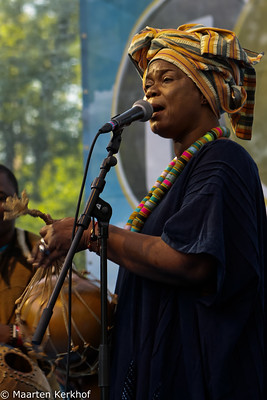Nahawa Doumbia creates music that lives on with latest release

Nahawa Doumbia has been crafting tight, melodically-focused Wassoulou music for the better part of four decades, and as 2021 kicks into gear, she doesn’t seem to be showing any signs of slowing down.
I first discovered Doumbia’s music on Volume 3 of her Grande Cantatrice Malienne series—the first release from the then-new label: Awesome Tapes from Africa.
On it, my ears were graced with swirling guitars, pounding drums and a vocal style that I was entirely unfamiliar with, one that was somehow both gripping and calming all at once.
Immediately obvious to me was the language barrier. Over 80 languages are spoken in Mali according to Ethnologue, and despite French being the national language, even if the album was in French, my elementary-level knowledge of the language would likely not have sufficed.
In spite of this, I felt that I was able to catch some of the sentiments that Doumbia was at once so fervently and intently expressing through sheer force of will on her behalf.
And almost 40 years later, we hear an evidently older and wiser Doumbia on Kanawa, but with all of the same intent and focus behind her words. The relatively sparse instrumentation of her 80’s recordings is no more.
Here, Doumbia is able to flourish in a much richer timbral context, with background singers harmonizing and complementing her vocals in what at times seems like a call-and-response pattern.
However, on tracks like ‘“Djougoh’”, the beauty of the music lies in the simplicity of Doumbia’s vocals amongst the plucking of the kamalé n’goni and the steadfast percussion.
The title track, “‘Kanawa’”, seems much more modern in its execution, the backing vocalists closely echoing Doumbia as they weave in and out of the driving percussion with apparent ease.
This is the voice of a singer whose level of knowledge is evident: she is a veteran in the field and is well-suited to address her concerns.
And her concerns are clear, as they are directly noted in the album’s liner notes; she is worried about the fate of the younger Malian generation.
As she writes, “The meaning of ‘Kanawa’ is so simple. We see our children trying to cross the ocean all the time. I said that many of our children die in the ocean and some of them while crossing the Sahara.”
“This song is about that message and I chose it as the title of my album because I like it.” She sums it up quite clearly at the end, where she states that leaving the country “is not the only solution. That’s my message.”
And at the core of music, that’s about all it comes down to: a message.
Music is one of the many ways that people convey their messages, their ideas, their thoughts and their feelings, and those who are skilled at compressing them into a musical format often flourish. I strongly feel that Nahawa Doumbia is a proud member of that group, and in all likelihood, she will continue to be for the foreseeable future. Kanawa stands as living proof of that fact, a veritable release that will likely outlive her—and possibly outlive you and me—and will undoubtedly continue to inspire a generation of young Malians and others alike.


